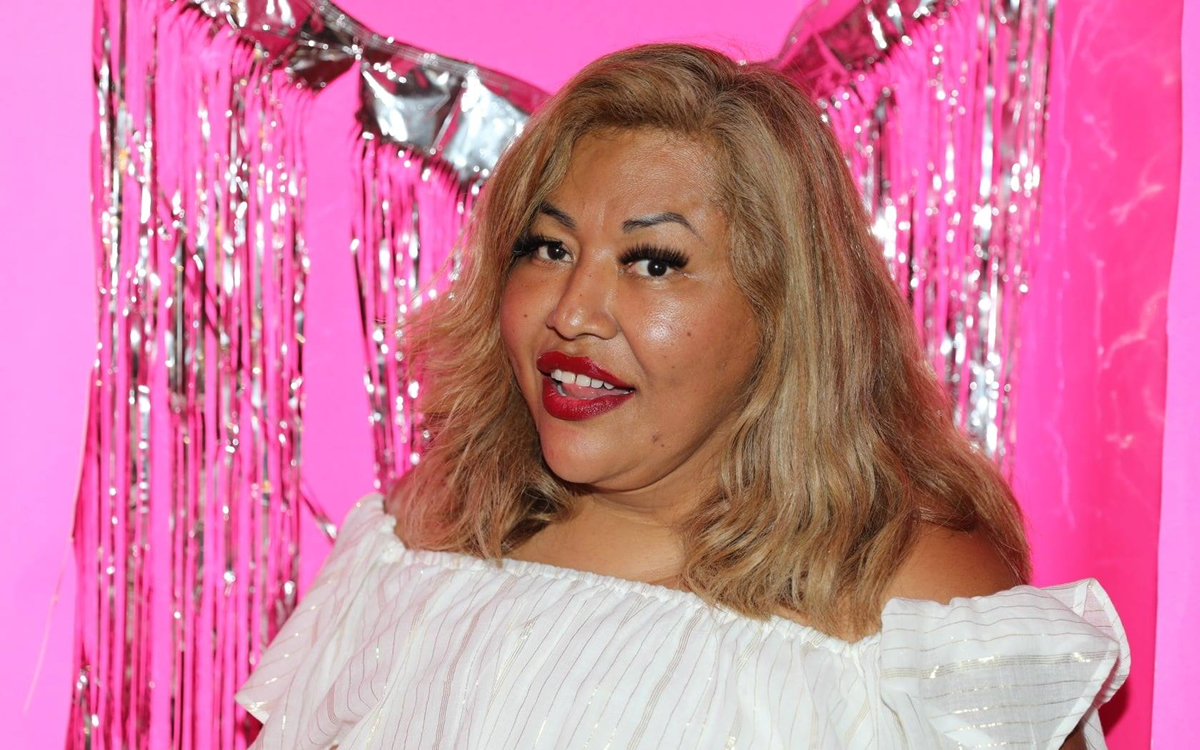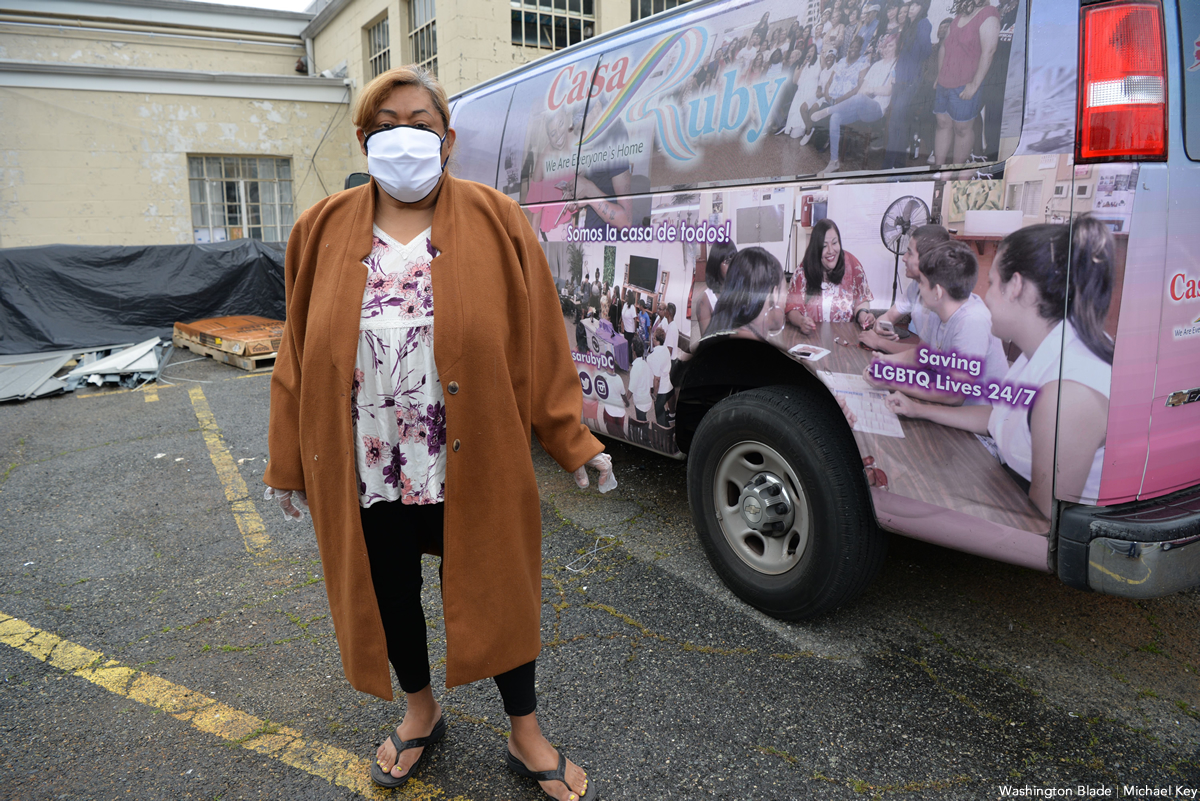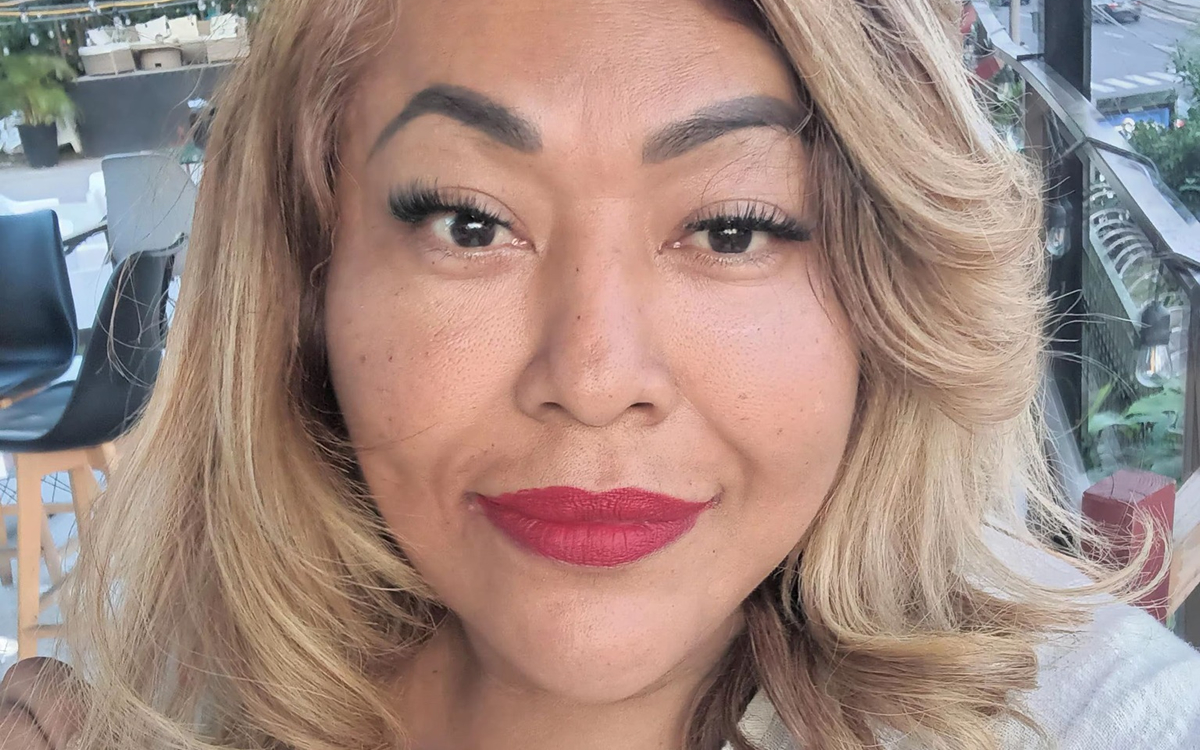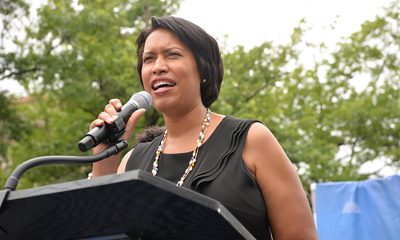District of Columbia
Judge dismisses lawsuit against Casa Ruby board members
Blade catches up with Ruby Corado in El Salvador

The latest hearing in the civil case against Ruby Corado and Casa Ruby took place in D.C. Superior Court on July 21.
Corado did not attend the hearing in person, but called in from El Salvador where she currently lives.
The latest hearing focused on the three limited liability companies that Corado created and controlled: Casa Ruby LLC that did business as Moxie Health, Pneuma Behavioral Health LLC and Tigloballogistics LLC that operated as Casa Ruby Pharmacy.
The Office of the D.C. Attorney General has sued the three entities. Corado on July 21 wanted to testify on their behalf, but D.C. Superior Court Judge Danya A. Dayson told her she could not because legal rules prevent her from doing so. Corado has also not provided a lawyer to represent the companies.
Dayson on July 21 approved a motion filed by the Office of the D.C. Attorney General calling for her to issue a default judgement against the three LLC companies that requires them to pay a sum of money they allegedly improperly received from the original Casa Ruby at Corado’s direction and allegedly sent to Corado’s personal bank account.

Corado in December 2022 told the Washington Blade during an interview in San Salvador, the Salvadoran capital, the case against her and Casa Ruby amounts to “persecution.” Corado once again spoke with the Blade on July 28 in El Salvador.
Corado said the allegations against her are the “result of many movements that have been made against her activism.”
“Many haters began to criticize me because a trans Latina woman had so much privilege in Washington, D.C.,” said Corado.
Corado left El Salvador in the 1980s during the country’s civil war.
She said the only thing she did once she arrived in the U.S. was to work on behalf of those who needed help. Corado told the Blade she wanted to work for the ideals of the LGBTQ rights movement, and not for herself.
Corado said she began to see what she described as the D.C. government sabotaging social change six years ago, and she reinterated her previous claims that political persecution stemmed from it.
“I did things that had to be done,” said Corado.
Corado referenced the three allegations against her — Casa Ruby did not have a board, the board never held meetings over 10 years and she gave herself a salary without the board’s authorization — and reiterated her belief that she is the victim. Corado told the Blade the D.C. government’s decision to no longer fund Casa Ruby did not impact her, but the LGBTQ people who benefitted from what she described as this “historic project.”
The Office of the D.C. Attorney General has also accused Corado of withdrawing more than $400,000 of Casa Ruby funds to work in El Salvador. Corado maintains it was a personal loan that she made to the board and it was approved.
“This was to look for self-sustainable projects and at the same time to provide sustainability to Casa Ruby in Washington, D.C.,” Corado told the Blade.
She also said she has the necessary evidence that proves she owes the bank money because it transferred the funds to her as a personal credit. Corado told the Blade this evidence has not been presented in the case because it has yet to be discussed.
Corado said she justified the efforts to make Casa Ruby self-sufficient because she had seen other organizations in the U.S. do car washes, enter into partnerships with large businesses that sold products, open pharmacies and launch other projects that helped them become financially independent.
“The idea was born back in the year 2018 when I visited El Salvador with the mayor of D.C., Muriel Bowser, to talk about projects to mitigate migration,” she said.
Corado said she decided to support projects that would benefit LGBTQ Salvadorans in order to stop migration from the country. She also told the Blade she wanted to implement initiatives that would have employed LGBTQ people and provided support to older adults in the community.

Consuella López, who was the board’s president, and Meredith Zoltick, who was the board’s secretary, both testified during the July 21 hearing.
Corado told the Blade that López and Zoltick both testified there was a board during the time it was alleged that one didn’t exist.
“They mentioned there had been board meetings, but they didn’t always take notes,” said Corado. “They also said that they had indeed approved my salary.”
Corado told the Blade that López and Zoltick in their testimony denied all of the allegations against her. Corado added statements that Holly Goldmann, who was a Casa Ruby staffer, has also supported her.
The Blade couldn’t immediately reach Zoltick and Lopez to confirm Corado’s assertion that they gave statements to the court disputing the allegations against Corrado. Goldmann also couldn’t immediately be reached for comment.
The Wanda Alston Foundation, which Dayson has named as Casa Ruby receiver, has sued the former board members on grounds that they failed to adequately oversee the Casa Ruby operations and Corado’s role as executive director.
Dayson on May 1 dismissed the complaint against all but one of the former board members, Consuella Lopez. The judge states in her ruling that Lopez was an exception because the complaint presents evidence that Corado issued Lopez a Casa Ruby credit card to use for her personal expenses and doing that provided legal grounds for the complaint against her to continue. The Wanda Alston Foundation has appealed the decision to dismiss the complaint against the other board members.
The civil case against Corado and Casa Ruby will continue.
It remains unclear whether Corado has retained a lawyer, but she said the attorney who continues to advise her has said he must follow the legal process. Corado, for her part, told the Blade she will remain in El Salvador to continue with what she describes as the process of “self care” for her physical and mental health.
Lou Chibbaro, Jr. and Michael K. Lavers contributed to this story.
District of Columbia
D.C. police arrest man for burglary at gay bar Spark Social House
Suspect ID’d from images captured by Spark Social House security cameras

D.C. police on Feb. 18 arrested a 63-year-old man “of no fixed address” for allegedly stealing cash from the registers at the gay bar Spark Social House after unlawfully entering the bar at 2009 14th St., N.W., around 12:04 a.m. after it had closed for business, according to a police incident report.
“Later that day officers canvassing for the suspect located him nearby,” a separate police statement says. “63-year-old Tony Jones of no fixed address was arrested and charged with Burglary II,” the statement says.
The police incident report states that the bar’s owner, Nick Tsusaki, told police investigators that the bar’s security cameras captured the image of a man who has frequently visited the bar and was believed to be homeless.
“Once inside, the defendant was observed via the establishment’s security cameras opening the cash register, removing U.S. currency, and placing the currency into the left front pocket of his jacket,” the report says.
Tsusaki told the Washington Blade that he and Spark’s employees have allowed Jones to enter the bar many times since it opened last year to use the bathroom in a gesture of compassion knowing he was homeless. Tsusaki said he is not aware of Jones ever having purchased anything during his visits.
According to Tsusaki, Spark closed for business at around 10:30 p.m. on the night of the incident at which time an employee did not properly lock the front entrance door. He said no employees or customers were present when the security cameras show Jones entering Spark through the front door around 12:04 a.m.
Tsusaki said the security camera images show Jones had been inside Spark for about three hours on the night of the burglary and show him taking cash out of two cash registers. He took a total of $300, Tsusaki said.
When Tsusaki and Spark employees arrived at the bar later in the day and discovered the cash was missing from the registers they immediately called police, Tsusaki told the Blade. Knowing that Jones often hung out along the 2000 block of 14th Street where Spark is located, Tsusaki said he went outside to look for him and saw him across the street and pointed Jones out to police, who then placed him under arrest.
A police arrest affidavit filed in court states that at the time they arrested him police found the stolen cash inside the pocket of the jacket Jones was wearing. It says after taking him into police custody officers found a powdered substance in a Ziploc bag also in Jones’s possession that tested positive for cocaine, resulting in him being charged with cocaine possession in addition to the burglary charge.
D.C. Superior Court records show a judge ordered Jones held in preventive detention at a Feb. 19 presentment hearing. The judge then scheduled a preliminary hearing for the case on Feb. 20, the outcome of which couldn’t immediately be obtained.
District of Columbia
Judge rescinds order against activist in Capital Pride lawsuit
Darren Pasha accused of stalking organization staff, board members, volunteers

A D.C. Superior Court judge on Feb.18 agreed to rescind his earlier ruling declaring local gay activist Darren Pasha in default for failing to attend a virtual court hearing regarding an anti-stalking lawsuit brought against him by the Capital Pride Alliance, the group that organizes D.C.’s annual Pride events.
The Capital Pride lawsuit, initially filed on Oct. 27, 2025, accuses Pasha of engaging in a year-long “course of conduct” of “harassment, intimidation, threats, manipulation, and coercive behavior” targeting Capital Pride staff, board members, and volunteers.
In his own court filings without retaining an attorney, Pasha has strongly denied the stalking related allegations against him, saying “no credible or admissible evidence has been provided” to show he engaged in any wrongdoing.
Judge Robert D. Okum nevertheless on Feb. 6 approved a temporary stay-away order requiring Pasha to stay at least 100 feet away from Capital Pride’s staff, volunteers, and board members until the time of a follow-up court hearing scheduled for April 17. He reduced the stay-away distance from 200 yards as requested by Capital Pride.
In his two-page order issued on Feb. 18, Okun stated that Pasha explained that he was involved in a scooter accident in which he was injured and his phone was damaged, preventing him from joining the Feb. 6 court hearing.
“Therefore, the court finds there is a good cause for vacating the default,” Okun states in his order.
At the time he initially approved the default order at the Feb. 6 hearing that Pasha didn’t attend, Okun scheduled an April 17 ex parte proof hearing in which Capital Pride could have requested a ruling in its favor seeking a permanent anti-stalking order against Pasha.
In his Feb. 18 ruling rescinding the default order Okun changed the April 17 ex parte proof hearing to an initial scheduling conference hearing in which a decision on the outcome of the case is not likely to happen.
In addition, he agreed to consider Pasha’s call for a jury trial and gave Capital Pride 14 days to contest that request. The Capital Pride lawsuit initially called for a non-jury trial by judge.
One request by Pasha that Okum denied was a call for him to order Capital Pride to stop its staff or volunteers from posting information about the lawsuit on social media. Pasha has said the D.C.-based online blog called DC Homos, which Pasha claims is operated by someone associated with Capital Pride, has been posting articles portraying him in a negative light and subjecting him to highly negative publicity.
“The defendant has not set forth a sufficient basis for the court to restrict the plaintiff’s social media postings, and the court therefore will deny the defendant’s request in his social media praecipe,” Okun states in his order.
A praecipe is a formal written document requesting action by a court.
Pasha called the order a positive development in his favor. He said he plans to file another motion with more information about what he calls the unfair and defamatory reports about him related to the lawsuit by DC Homos, with a call for the judge to reverse his decision not to order Capital Pride to stop social media postings about the lawsuit.
Pasha points to a video interview on the LGBTQ Team Rayceen broadcast, a link to which he sent to the Washington Blade, in which DC Homos operator Jose Romero acknowledged his association with Capital Pride Alliance.
Capital Pride Executive Director Ryan Bos didn’t immediately respond to a message from the Blade asking whether Romero was a volunteer or employee with Capital Pride.
Pasha also said he believes the latest order has the effect of rescinding the temporary stay away order against him approved by Okun in his earlier ruling, even though Okun makes no mention of the stay away order in his latest ruling. Capital Pride attorney Nick Harrison told the Blade the stay away order “remains in full force and effect.”
Harrison said Capital Pride has no further comment on the lawsuit.
District of Columbia
Trans activists arrested outside HHS headquarters in D.C.
Protesters demonstrated directive against gender-affirming care

Authorities on Tuesday arrested 24 activists outside the U.S. Department of Health and Human Services headquarters in D.C.
The Gender Liberation Movement, a national organization that uses direct action, media engagement, and policy advocacy to defend bodily autonomy and self-determination, organized the protest in which more than 50 activists participated. Organizers said the action was a response to changes in federal policy mandated by Executive Order 14187, titled “Protecting Children from Chemical and Surgical Mutilation.”
The order directs federal agencies and programs to work toward “significantly limiting youth access to gender-affirming care nationwide,” according to KFF, a nonpartisan, nonprofit organization that provides independent, fact-based information on national health issues. The executive order also includes claims about gender-affirming care and transgender youth that critics have described as misinformation.
Members of ACT UP NY and ACT UP Pittsburgh also participated in the demonstration, which took place on the final day of the public comment period for proposed federal rules that would restrict access to gender-affirming care.
Demonstrators blocked the building’s main entrance, holding a banner reading “HANDS OFF OUR ‘MONES,” while chanting, “HHS—RFK—TRANS YOUTH ARE NO DEBATE” and “NO HATE—NO FEAR—TRANS YOUTH ARE WELCOME HERE.”
“We want trans youth and their loving families to know that we see them, we cherish them, and we won’t let these attacks go on without a fight,” said GLM co-founder Raquel Willis. “We also want all Americans to understand that Trump, RFK, and their HHS won’t stop at trying to block care for trans youth — they’re coming for trans adults, for those who need treatment from insulin to SSRIs, and all those already failed by a broken health insurance system.”
“It is shameful and intentional that this administration is pitting communities against one another by weaponizing Medicaid funding to strip care from trans youth. This has nothing to do with protecting health and everything to do with political distraction,” added GLM co-founder Eliel Cruz. “They are targeting young people to deflect from their failure to deliver for working families across the country. Instead of restricting care, we should be expanding it. Healthcare is a human right, and it must be accessible to every person — without cost or exception.”

Despite HHS’s efforts to restrict gender-affirming care for trans youth, major medical associations — including the American Medical Association, the American Academy of Pediatrics, and the Endocrine Society — continue to regard such care as evidence-based treatment. Gender-affirming care can include psychotherapy, social support, and, when clinically appropriate, puberty blockers and hormone therapy.
The protest comes amid broader shifts in access to care nationwide.
NYU Langone Health recently announced it will stop providing transition-related medical care to minors and will no longer accept new patients into its Transgender Youth Health Program following President Donald Trump’s January 2025 executive order targeting trans healthcare.




















